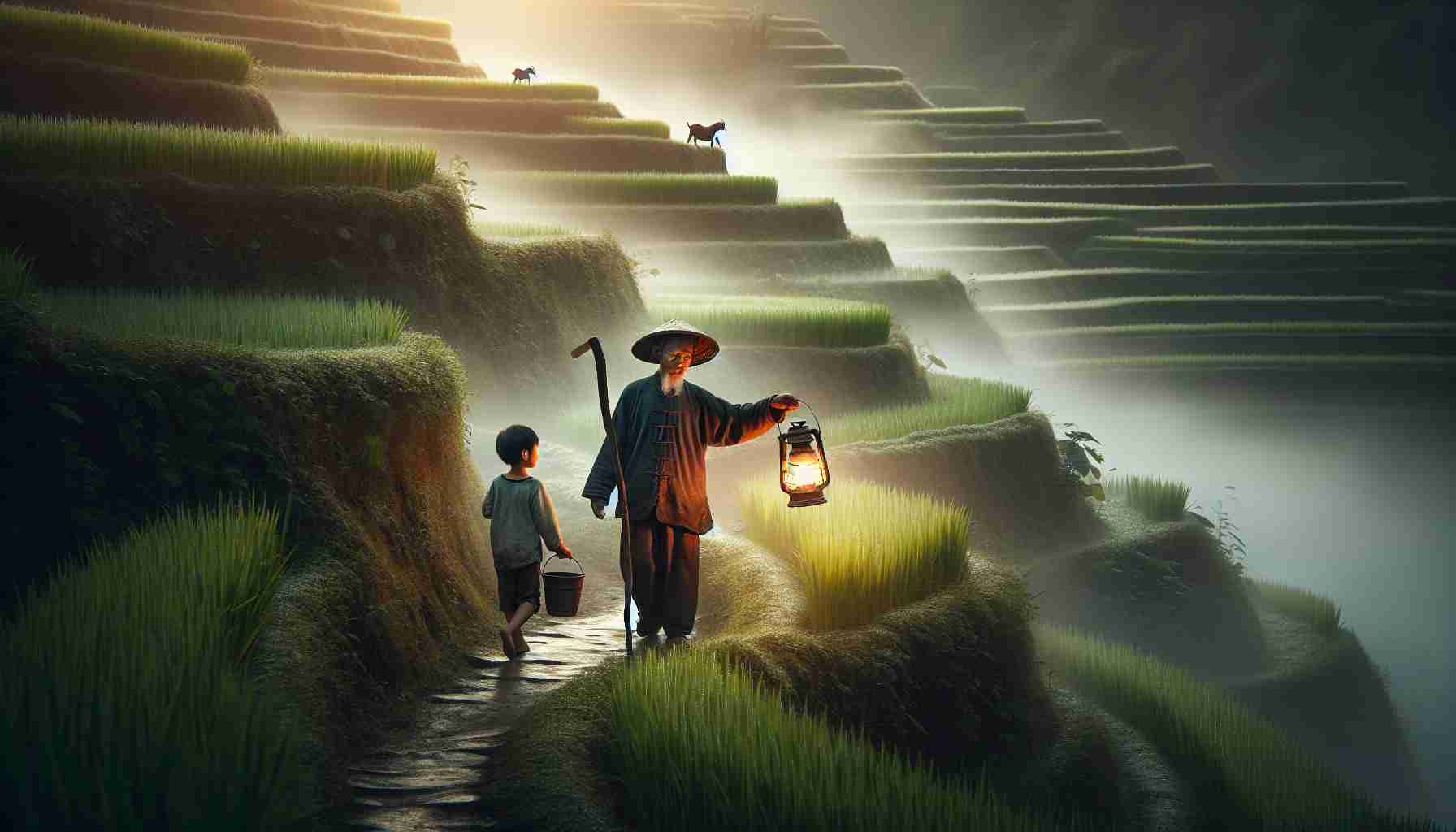

The morning fog sat low over the valley, wrapping the rice fields in a quiet stillness. I was just a boy then, following Grandpa along the muddy path to the barn. He carried his old lantern—wooden handle worn smooth—and I carried a heart full of impatience.
“Why don’t you just walk faster?” I said, hopping ahead. “You always move so slow!”
Grandpa chuckled softly. “The lantern doesn’t rush, and yet it shows us the way,” he said, lifting it gently in front of us.
I frowned. “That doesn’t make sense. The lantern isn’t alive.”
He stopped walking and turned to me. “But it’s still useful, even in its stillness.”
I didn’t understand him. I thought to myself, If we don’t hurry, the animals will go hungry, and I sprinted ahead, my shoes splashing muddy water with every step.
When I reached the barn, I threw open the doors and startled the hens, sending them fluttering into the rafters. The goat kicked over its bucket, and the ox began to bellow. I tried to calm them, but everything I did only made it worse.
A few minutes later, Grandpa arrived. He placed the lantern gently on a hook, its light steady and calm. He didn’t say a word. He just walked slowly to the animals. He moved smoothly, without force, humming softly. He didn’t rush—even though I could tell he had seen the mess I had made.
And one by one, the animals settled.
“How did you do that without saying a word?” I asked, my face burning with embarrassment.
He looked at me kindly. “When water flows over stones, it doesn’t try to move them. It just flows. That’s the way of the Tao. Let things be, and they come to rest on their own.”
“But I tried really hard,” I whispered.
“I know,” he said. “But trying hard sometimes feels like pushing the river backward. There’s a way to do without forcing. It’s called wu wei. Effortless action.”
That evening, as the sun fell behind the hills, Grandpa lit the lantern again. “This lantern doesn’t push away the dark. It just shines.”
We walked back to the house without a sound between us. But something inside me felt different. I walked more slowly. I listened more deeply.
Over the days that followed, I began to practice what Grandpa had shown me. I moved gently when feeding the animals. I stepped softly through the fields. I tried to listen first, then act only when I needed to.
Things began to change, not just around me—but in me, too.
I didn’t change overnight. But now, whenever I feel the urge to rush or force my way forward, I remember the lantern. Still, quiet, and yet—full of light.
And I smile, letting the moment shine on its own.
The morning fog sat low over the valley, wrapping the rice fields in a quiet stillness. I was just a boy then, following Grandpa along the muddy path to the barn. He carried his old lantern—wooden handle worn smooth—and I carried a heart full of impatience.
“Why don’t you just walk faster?” I said, hopping ahead. “You always move so slow!”
Grandpa chuckled softly. “The lantern doesn’t rush, and yet it shows us the way,” he said, lifting it gently in front of us.
I frowned. “That doesn’t make sense. The lantern isn’t alive.”
He stopped walking and turned to me. “But it’s still useful, even in its stillness.”
I didn’t understand him. I thought to myself, If we don’t hurry, the animals will go hungry, and I sprinted ahead, my shoes splashing muddy water with every step.
When I reached the barn, I threw open the doors and startled the hens, sending them fluttering into the rafters. The goat kicked over its bucket, and the ox began to bellow. I tried to calm them, but everything I did only made it worse.
A few minutes later, Grandpa arrived. He placed the lantern gently on a hook, its light steady and calm. He didn’t say a word. He just walked slowly to the animals. He moved smoothly, without force, humming softly. He didn’t rush—even though I could tell he had seen the mess I had made.
And one by one, the animals settled.
“How did you do that without saying a word?” I asked, my face burning with embarrassment.
He looked at me kindly. “When water flows over stones, it doesn’t try to move them. It just flows. That’s the way of the Tao. Let things be, and they come to rest on their own.”
“But I tried really hard,” I whispered.
“I know,” he said. “But trying hard sometimes feels like pushing the river backward. There’s a way to do without forcing. It’s called wu wei. Effortless action.”
That evening, as the sun fell behind the hills, Grandpa lit the lantern again. “This lantern doesn’t push away the dark. It just shines.”
We walked back to the house without a sound between us. But something inside me felt different. I walked more slowly. I listened more deeply.
Over the days that followed, I began to practice what Grandpa had shown me. I moved gently when feeding the animals. I stepped softly through the fields. I tried to listen first, then act only when I needed to.
Things began to change, not just around me—but in me, too.
I didn’t change overnight. But now, whenever I feel the urge to rush or force my way forward, I remember the lantern. Still, quiet, and yet—full of light.
And I smile, letting the moment shine on its own.